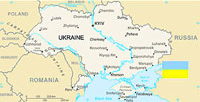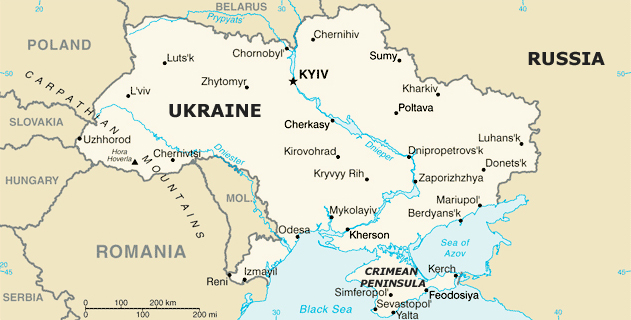Ukraine’s Revolutionaries Surrender to Corruption

(Bloomberg – bloomberg.com – Leonid Bershidsky – August 18, 2014) To international audiences, Ukraine is now no more than the scene of a Russian-inspired armed conflict. The fighting, however, is confined to areas that are home to 6.5 million of Ukraine’s total population of 45 million. Although the outcome there is important to all Ukrainians, there is a bigger issue: Will the country emerge from the wreckage as a better, cleaner one? Some of the heroes of the Maidan revolution, which toppled the corrupt government of President Viktor Yanukovych in February, are beginning to doubt that.
Tetyana Chornovil is one of those heroes, a firebrand investigative journalist and anti-corruption activist whose beating in December, apparently at the hands of pro-Yanukovych thugs, sparked mass outrage. After the regime fell, she was put in charge of the new government’s anti-corruption policy. Now, she’s quitting, as she announced in a lengthy column on pravda.com.ua, saying her presence in the government was “useless.” “There is no political will in Ukraine for an uncompromising, wide-scale war on corruption,” she wrote, complaining that all her initiatives had drowned in a “bureaucratic swamp” and that Prime Minister Arseniy Yatsenyuk was not interested in attacking the business interests of Ukrainian oligarchs to avoid vilification by oligarch-controlled media.
Chornovil’s bitterness and sense of futility was amplified by the death of her husband, Nikolai Berezovoy, killed in action near Donetsk. Hers is not an isolated case, though: less than two weeks ago, Andriy Parubiy, head of the Defense and National Security Council, also tendered his resignation.
During the winter protests, Parubiy was an important figure, heading the self-defense force that fought off Yanukovych’s riot police on the barricades. He declined to comment on his resignation, saying it would be “unacceptable” while his country is at war. The version making the rounds in Kiev, however, is that Parubiy wanted President Petro Poroshenko to be even tougher than he has been in fighting separatist rebels in eastern Ukraine, as well as in countering Russian propaganda.
Chornovil and Parubiy are not known for their management prowess. It might be only natural that the romantic radicals who stood on the barricades last winter and received government posts in recognition should now step aside for professionals to do their job. The problem is that the people who empowered the new government, and voted for Poroshenko, had many of the same romantic notions as Chornovil and Parubiy, especially with regards to corruption fighting and the radicalism and speed of necessary reforms.
Kakha Bendukidze, the libertarian multimillionaire who revamped the regulatory system in another former Soviet republic, Georgia, spoke for many of these idealists late last month when he said the Ukrainian government did not realize how little time it had to achieve visible improvements in reducing the tax burden and dismantling the stifling bureaucracy that so wearied Chornovil. “What will happen when the guys who are now fighting in the east come home?” heasked during a public lecture in Kiev. “Where are reforms, where’s change? They will knock you guys on the forehead, they won’t consider you men.”
Ukrainians do report some improvements in the regulatory climate: There is not as much pressure to pay bribes, the government procurement system is now more transparent, and the government has proposed cutting the number of business taxes from 22 to nine. Ukraine is still, however, an incredibly corrupt and business-unfriendly country. Today, one of the nation’s biggest wine importers, Wine Bureau, accused the Ukrainian Security Service and the economics ministry of extorting a bribe by demanding that the company get its trading partners to paste Ukrainian excise stamps on wine bottles instead of doing that through a logistics company. The demand is unreasonable — many of the wine producers lack the necessary equipment — and useless from a fiscal point view because the government receives tax revenue when Wine Bureau buys the stamps. The government, however, used it as a pretext to stop Wine Bureau from bringing in new supplies.
“We have decided we’d rather close our stores than pay a bribe,” the company declared on its Facebook page.
The Legatum Institute, a London think tank, wrote in a recent report on Ukraine: “With so many officials remaining in their old jobs, so many of the old schemes remaining legal, and with the courts, police, and prosecutors in no condition to punish offenders, Ukrainians worry that the gains of the revolution are not yet won. Their battle to build an honest state, already complicated by the unrest in the south east, is extremely complex and far from over.”
Winning that battle will require the political will that Chornovil found lacking — and help from the West in investigating the ill-gotten wealth of Yanukovych’s family and cronies and in setting up anti-corruption controls for the new government. In one way or another, the fighting in eastern Ukraine will end, and the country will need to restore the ravaged regions’ economies and patch up an enormous fiscal hole that is now closed with Western aid. Perhaps the winter revolution’s romantics will take to the barricades again if Ukraine’s “quiet” part fails to change in earnest before peace comes to the east.
Article ©2014 Bloomberg L.P. All Rights Reserved. Article also appeared at http://www.bloombergview.com/articles/2014-08-18/ukraine-s-revolutionaries-surrender-to-corruption

